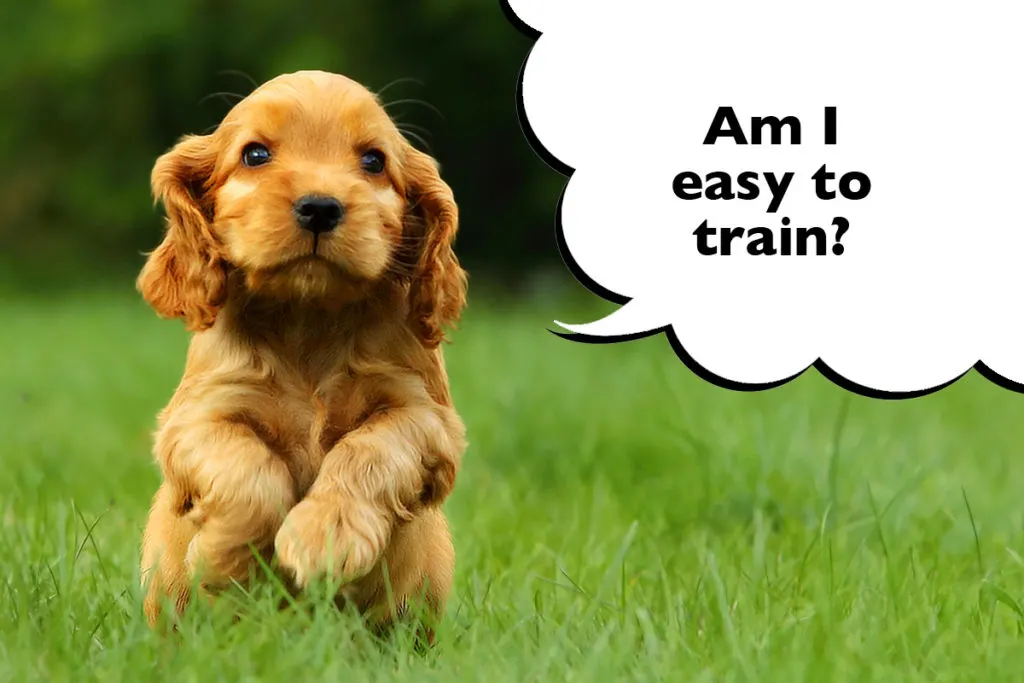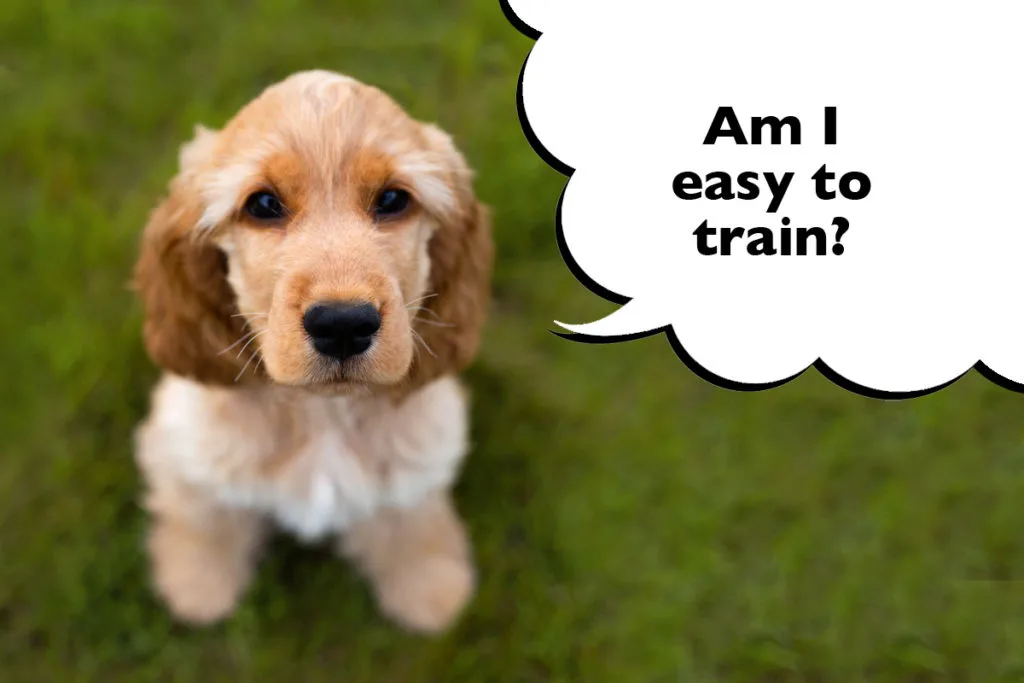Do you have a Cocker Spaniel puppy or maybe you’d like to get one? Do you want to find out how easy Cocker Spaniels are to train? Here’s everything you need to know about Cocker Spaniels and training!
Are Cocker Spaniels Easy To Train? Yes, Cocker Spaniels are easy to train. They’re highly intelligent and keen to learn, which can make teaching them new things an easy, fun and enjoyable process for you both. Not only are they easy to train, but they thrive when learning new behaviors!
Read on to find out what makes Cocker Spaniels so easy to train and how it’s best to train them.
Never use the advice in this article as a substitute for professional veterinary advice or treatment. I am NOT a Vet, qualified dog trainer or dog behaviourist. This article is based on research, personal opinion and experience of owning dogs over the last 12+ years.
Why Are Cocker Spaniels Easy To Train?
Cockers Spaniels are easy to train because they’re enthusiastic, loyal and eager to please their families.
This combination of traits can make it much easier to train them compared with other breeds.
Cockers have been bred since the late 1800s as gundogs, originally to retrieve woodcock, hence their name!
Because of this, they’re able to work closely with their owners and listen to their commands.
How Do I Train My Cocker Spaniel?
This is how to train your Cocker Spaniel:
Train Your Cocker Spaniel Using Positive Methods
Cocker Spaniels respond best to positive training methods. Rewarding them for good behavior is scientifically proven to encourage them to behave this way again in the future.
Positive reinforcement works by repetitively rewarding your Cocker for showing good behavior. It’s the fastest, kindest and most effective way to train your Cocker Spaniel.
Use A Clicker To Train Your Cocker Spaniel
Cocker Spaniels can respond well to clicker training because it’s a form of positive reinforcement training.
To start with, you need to pair the clicker’s sound with a reward.
By doing this, your Cocker Spaniel will soon realize that when they hear the click, they’ve done something good, so they’ll be rewarded for it.
Clicker training can help you be more accurate too, so you’re able to pinpoint the exact behavior you want to reward your Cocker for.
Don’t Use Aversive Tools Or Handling
Cocker Spaniels can be a sensitive breed, so they don’t respond well to harsh handling or aversive training tools.
If you’re using choke chains, electric shock collars, prong collars, or spraying your Cocker with water when they do something wrong, they can quickly become depressed and scared of interacting with you.
These tools are a sure-fire way to damage the bond you share with each other and make your Cocker Spaniel much less likely to want to learn anything new.
Reward Your Cocker Spaniel Well For Good Behavior
Cocker Spaniels are often greedy, so they love tasty treats! Choose high-value treats they only get during training sessions, so they’ll work hard for them.
They usually love playtime too, so you could also reward them with a fun game of fetch or tug if they enjoy that more than food.
Find whatever your Cocker enjoys most of all and use it as a reward for behaving well.

Train Your Cocker Spaniel Little And Often
It’s best to do several short training sessions throughout the day, instead of one long one every so often.
Do short, 5–10-minute sessions a few times per day. The more you practice new behaviors, the more likely your Cocker Spaniel will fully understand them.
Keeping your training sessions short also helps to keep your Cocker interested and keen to learn.
If you train them for too long at once, they can quickly lose interest and look for something more exciting to do!
Motivate Your Cocker Spaniel To Learn
Although Cocker Spaniels are eager to please and keen to learn, it’s essential they find you motivating as a teacher.
If you approach their training as if it’s a tedious chore, your Cocker won’t be as keen to learn.
If you constantly repeat the same command in a drab tone of voice, your Cocker will probably switch off and start ignoring you.
So, always keep your training sessions positive and upbeat and if you feel yourself getting frustrated, come back to it another time.
Train Your Cocker Spaniel Consistently
Although Cocker Spaniels are quite easy to train, you still need to teach them consistently.
Make sure you always use the same commands, so your Cocker understands what you’re asking them to do.
Just because you know that ‘Sit’ and ‘Sit Down’ might mean the same thing, it can confuse your Cocker.
Make Training Sessions Fun For Your Cocker Spaniel
Earning themselves the nickname of ‘Merry Cockers’, Cocker Spaniels are a happy and fun-loving breed. They’ll be much more likely to want to learn if they find training fun!
If they’re getting frustrated and struggling to learn something new, try to make it easier for them.
Setting them up for success instead of failure, will encourage them to keep learning new things.
Teaching cute party tricks like roll-over or twist will be more exciting for your Cocker to learn, so be sure to give them a chance to learn these types of things as well as the basics.

Don’t Expect Your Cocker Spaniel To Know Things
Just because Cocker Spaniels are a naturally intelligent breed, this doesn’t mean they’ll automatically know certain things.
They’re not born with the inbuilt knowledge of how to walk nicely on a leash, or how to come when you call them. These are things they need to be taught by you.
So, don’t get annoyed with them if they don’t seem to be listening to you. It’s likely they’re not sure what you’re asking them to do.
Give Your Cocker Spaniel Time To Rest
Although Cocker Spaniels love to learn, it’s also crucial they’ve got time to rest as well.
Constantly training them can wear them out, making them overtired which can contribute to bad behaviors.
They’re also able to process new learning better, when they’ve had time to relax and sleep after training too.
Discourage Any Unwanted Behaviors
Your Cocker Spaniel’s high intelligence can be a blessing and a curse!
While they’re able to quickly pick up good behaviors when you’re training them, they can also pick up bad behaviors just as fast!
Without plenty of mental stimulation and consistent training, Cockers will look for their own ways to keep their brain occupied.
If they start doing anything you would rather them not do, calmly discourage them and give them something more appropriate to do instead.
Interruption and redirection will likely play a big role in your dog training, especially when they’re young.
Teach Your Cocker Spaniel To Be Left Alone
Because Cocker Spaniels are such a loving and affectionate breed, they often form very close bonds with their families.
While this can help you train them better, it can make it more difficult for them to feel comfortable being left alone.
Cockers are unfortunately prone to developing separation anxiety, so you need to teach them it’s okay to be without you sometimes.
Ideally, this training should start when they’re a puppy, but either way, start slowly and gradually increase the time they’re on their own.
Socialize Your Cocker Spaniel Regularly
Cocker Spaniels are known to be a friendly and sociable breed, who are often happy to greet anyone!
They still need plenty of socialization opportunities from a young age though, to ensure they feel comfortable in new situations and surroundings.
Their friendly temperament can cause its own problems though, so you need to teach them that not every dog or person wants to be greeted when they’re out walking.
Calmly encourage your Cocker to walk past some dogs and people without stopping to say hello, and then reward them for doing so!
So there you have it! Cocker Spaniels are easy to train because they’re super-smart and keen to learn new things. By focusing on positive reinforcement, motivating them to learn, keeping things fun and training sessions short, you’ll soon have them listening to your every command!
What do I do next?
Thank you for reading all the way to the end of this article, your support for my blog means everything to me! If you found this article helpful, please kindly share below. Thank you!

